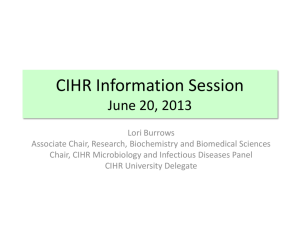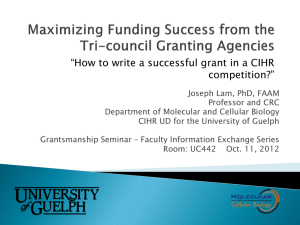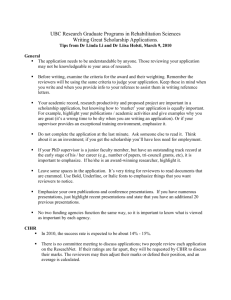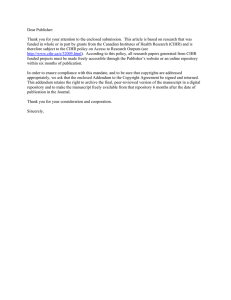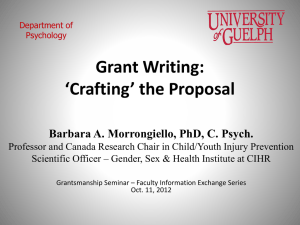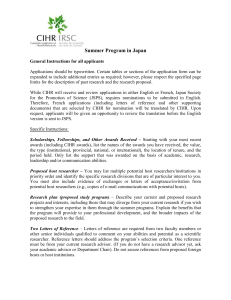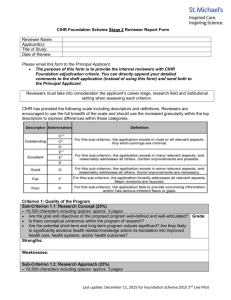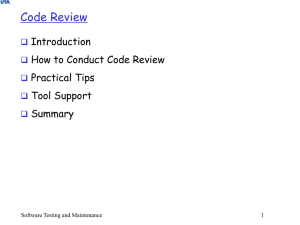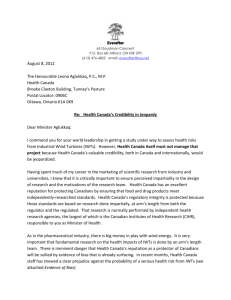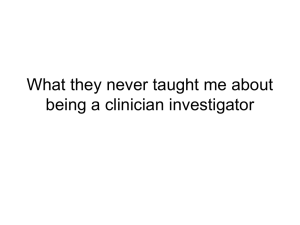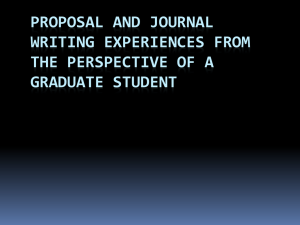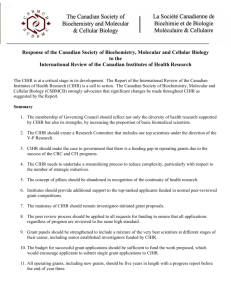2013 CIHR Info Session January 16, 2013
advertisement
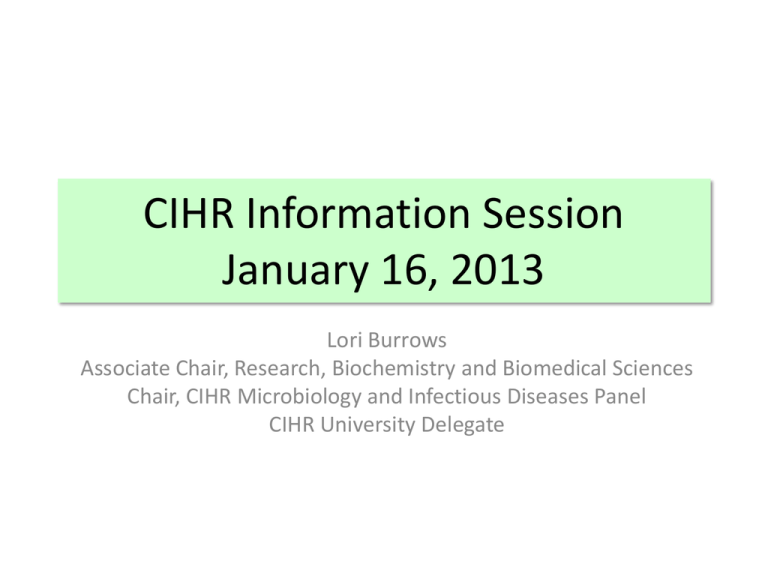
CIHR Information Session January 16, 2013 Lori Burrows Associate Chair, Research, Biochemistry and Biomedical Sciences Chair, CIHR Microbiology and Infectious Diseases Panel CIHR University Delegate What do you need to know for 2013? • The March and September 2013 Open Operating Grant competitions will run as usual • the Common CV has changed as of June 2012; if you already had a CCV, some of the information was transferred, but you must enter your publications and modify the other sections • If you want, you CAN continue to use attachments for your contributions (most significant contributions, publications, patents, other contributions) until they tell us otherwise Budgetary things that have changed... • stipends for graduate students and PDFs are no longer fixed but must be carefully justified • NO BENEFITS for trainees • staff salaries (technicians, research assistants, nurses etc.) can increase over the life of the grant, and benefits are permitted • NO EQUIPMENT requests permitted...but computers are now ‘supplies’ What do you need to know later? • CIHR is changing how applications to the Open Operating program are structured, reviewed and funded • perceived issues: – applicant burden (too many applications for the number that can be funded; too many people applying for multiple grants to fund large programs) – reviewer burden (too many grants, uneven reviews across committees, uneven quality of reviews) – multidisciplinary science that doesn’t fit existing peer review committee mandates What is happening now • • • • • • two grant streams, Foundation and Project Peer review: multi-stage, structured reviews development of a ‘College of Reviewers’ CIHR consultation of stakeholders (March 12, 2013) Continued modification of the plan based on pilots Overlap during the transition phase http://www.cihr-irsc.gc.ca/e/documents/or_des_for_future-en.pdf Project scheme ideas 2 stages: 1, virtual and 2, face to face 2/yr* 5 reviews at stage 1 *can only apply for 1 per year Foundation scheme Leaders 3 stages : 1 & 2 virtual; 3, face to face 1/yr* 1 = calibre *those who have ongoing OOGP funding won’t lose it if they are not successful with the single Foundation application 2 = quality Foundation scheme No tire kickers allowed. Your university/hospital needs to have your back. How many, how much $, and for how long? New people/groups get 5 yrs This is split between two competitions per year (right now the OOGP funds 800 grants per yr) Example - part of a structured review sheet for the Project scheme; criteria include concept (quality & importance of idea) and feasibility (approach, expertise & quality of environment). Budget doesn’t affect rating, though it’s examined. Example - part of a structured review sheet for stage 1 of the Foundation scheme; criteria include vision/direction and calibre of applicant (research leadership & productivity). Example - part of a structured review sheet for stage 2 of the Foundation scheme; criteria include quality of program (concept, approach); research capacity (expertise & mentoring plan); and quality of the support environment. Budget is considered without affecting ranking. The College of Reviewers - starting 2013 What do they want to do? Create a resource. What does this mean? Find ‘em, train ‘em, reward ‘em. The College of Reviewers - starting 2013 Where are they going to find 5 (good) reviewers for each app? When is all this going to happen? When is all this going to happen? 2013 2014 2015 2016 2017 How is all this going to happen? If your grant is due for renewal in Fall 2014…you get the first try at the Foundation scheme. There will be NO REGULAR COMPETITION THAT FALL. They are still trying to figure out what to do with those who are due to renew then, but don’t want to apply to the Foundation scheme. Questions? Lori Burrows burrowl@mcmaster.ca
